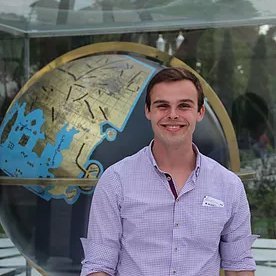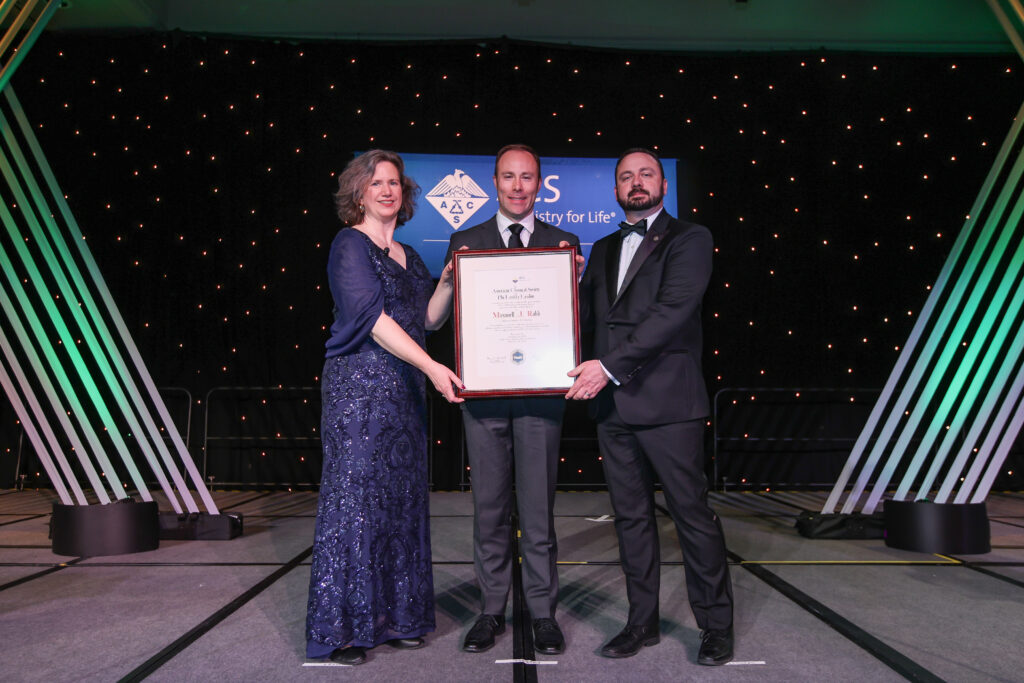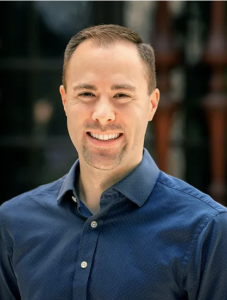Phi Lambda Upsilon – The aims and purposes of Phi Lambda Upsilon are the promotion of high scholarship and original investigation in all branches of pure and applied chemistry. Phi Lambda Upsilon was founded as an honorary chemical society in March 1899, at the University of Illinois. This was the first honor society dedicated to a single scientific discipline. In the span 113 years, Phi Lambda Upsilon has grown into an organization comprising seventy-three chapters and more than 60,000 members.
2024 National Fresenius Award to Jeffrey Dick of Purdue University
 The 2024 National Fresenius Award recipient is Professor Jeffrey Dick, the Richard B. Wetherill Associate Professor of Chemistry at Purdue University. Research in the Dick seeks to understand how chemistry changes under confinement and how nature takes advantage of this difference for the genesis and propagation of life by developing new measurement tools and instrumentation. Their team develops new instrumentation to make these measurements, with a particular emphasis on electrochemistry, which offers unmatched spatiotemporal resolution. https://www.nanoelectrochemistry.com/
The 2024 National Fresenius Award recipient is Professor Jeffrey Dick, the Richard B. Wetherill Associate Professor of Chemistry at Purdue University. Research in the Dick seeks to understand how chemistry changes under confinement and how nature takes advantage of this difference for the genesis and propagation of life by developing new measurement tools and instrumentation. Their team develops new instrumentation to make these measurements, with a particular emphasis on electrochemistry, which offers unmatched spatiotemporal resolution. https://www.nanoelectrochemistry.com/
Prof. Dick will be honored at the awards ceremony on Tuesday, March 25, 2025, in conjunction with the ACS Spring 2025 meeting in San Diego. For more information, visit the ACS website and see the announcement in C&EN.
Maxwell Robbs receives the Fresenius Award in New Orleans
PLU president Lucas Tucker presented the 2023 National Fresenius Award to Maxwell Robb at the March 2024 New Orleans ACS National Meeting awards banquet.
2023 National Fresenius Award to Maxwell Robb of California Institute of Technology

The 2023 National Fresenius Award recipient is Professor Maxwell Robb of the California Institute of Technology. Research in the Robb group focuses on polymer mechanochemistry, where mechanical force is used to activate chemical transformations in mechanically sensitive molecules known as mechanophores to produce a wide range of functional responses. The Robb group targets stimuli-responsive polymers to address challenges in a variety of areas including molecular release and stress sensing. https://www.robbgroup.caltech.edu/
Prof. Robb will be honored at the awards ceremony on Tuesday, March 19, 2024, in conjunction with the ACS Spring 2024 meeting in New Orleans. For more information, visit www.acs.org/nationalawards.
2022 National Fresenius Award to Todd Hyster of Cornell University

The 2022 National Fresenius Award recipient is Professor Todd Hyster of Cornell University. Research in the Hyster group focuses on developing new biocatalytic methods to address long-standing reactivity and selectivity challenges in organic synthesis. Using protein engineering and directed evolution, they develop photoenzymatic strategies for generating organic free radicals within protein active sites. They are also inventing new biocompatible photoredox reactions, enabling cascade reactions involving small molecule and enzymatic catalysts. These new tools can be applied to challenges encountered by the agrochemical and pharmaceutical industries. https://chemistry.cornell.edu/todd-hyster
Prof. Hyster will be honored at the awards ceremony on Tuesday, March 28, 2023, in conjunction with the ACS Spring 2023 meeting in Indianapolis. For more information, visit www.acs.org/nationalawards.
Fresenius Award Winner Song Lin Receives 2022 Green Chemistry Challenge Award
We would like to congratulate Song Lin (Cornell University) for being among the winners of the 2022 Green Chemistry Challenge Awards. Green chemistry technologies help our environment by preventing pollution at its source. More information about the award and 2022 winners can be found here: https://www.epa.gov/newsreleases/epa-announces-winners-2022-green-chemistry-challenge-awards
2021 National Fresenius Award to Song Lin
We would like to congratulate the 2021 Fresenius Award winner – Professor Song Lin of Cornell University. Lin leads an organic chemistry lab with specific research interests in synthetic electrochemistry, asymmetric catalysis, and organic materials. The Lin lab works to develop methodologies that expand both the scope and sustainability of synthetic chemistry using the unique capabilities offered by electrochemical systems. Particular emphases include the rational design of catalysts and the creative use of electrochemistry to enable the conversion of readily available starting materials into value-added products, such as pharmaceuticals and polymers.
would like to congratulate the 2021 Fresenius Award winner – Professor Song Lin of Cornell University. Lin leads an organic chemistry lab with specific research interests in synthetic electrochemistry, asymmetric catalysis, and organic materials. The Lin lab works to develop methodologies that expand both the scope and sustainability of synthetic chemistry using the unique capabilities offered by electrochemical systems. Particular emphases include the rational design of catalysts and the creative use of electrochemistry to enable the conversion of readily available starting materials into value-added products, such as pharmaceuticals and polymers.
Award Citation: For advancing creative catalytic strategies to control radical intermediates in regio- and stereoselective organic synthesis.
Congratulations also to all of the other ACS National Award Winners (updated September 2021). Recipients will be honored at the awards ceremony on Tuesday, March 22, 2022, in conjunction with ACS Spring 2022 in San Diego. Nominations are being accepted for the 2023 national awards through Nov. 1. For more information, visit www.acs.org/nationalawards.
2020 National Fresenius Award to Timothy Berkelbach
 We would like to congratulate the 2020 Fresenius Award winner – Professor Timothy Berkelbach of Columbia University. Berkelbach leads a theoretical chemistry group interested in the electronic and optical properties of molecular, nanoscale, and condensed-phase materials. The team works on a variety of quantum-mechanical problems motivated by excited-state phenomena. This research occurs at the interface of physical chemistry, condensed-matter physics, and materials science. In particular, Berkelbach is interested in quantum dynamics, the phenomenology of emerging materials, and first-principles condensed-phase quantum chemistry.
We would like to congratulate the 2020 Fresenius Award winner – Professor Timothy Berkelbach of Columbia University. Berkelbach leads a theoretical chemistry group interested in the electronic and optical properties of molecular, nanoscale, and condensed-phase materials. The team works on a variety of quantum-mechanical problems motivated by excited-state phenomena. This research occurs at the interface of physical chemistry, condensed-matter physics, and materials science. In particular, Berkelbach is interested in quantum dynamics, the phenomenology of emerging materials, and first-principles condensed-phase quantum chemistry.
Congratulations also to all of the other ACS National Award Winners (updated August 2020).
2019 National Fresenius Award to Kyle M. Lancaster
 Kyle M. Lancaster of Cornell University has won the 2019 National Fresenius Award, an ACS National Award sponsored by Phi Lambda Upsilon. The Lancaster lab at Cornell has been exploring the chemistry underlying nitrification, the biological use of ammonia as fuel. Their key findings to date are that the obligate intermediate hydroxylamine is turned into the greenhouse agent nitrous oxide by an enzyme cytochrome P460, establishing a direct link between agriculture/land use and N2O emissions. They also effected a major revision in the nitrogen cycle to include nitric oxide as another obligate nitrification intermediate. Another heavy component of my program concerns spectroscopic interrogation of transition metal catalysts, with a focus on identifying and characterizing elusive intermediates such as carbenoid and nitrenoids as well as relating “unusual” electronic structures such as inverted ligand fields to reactivity.
Kyle M. Lancaster of Cornell University has won the 2019 National Fresenius Award, an ACS National Award sponsored by Phi Lambda Upsilon. The Lancaster lab at Cornell has been exploring the chemistry underlying nitrification, the biological use of ammonia as fuel. Their key findings to date are that the obligate intermediate hydroxylamine is turned into the greenhouse agent nitrous oxide by an enzyme cytochrome P460, establishing a direct link between agriculture/land use and N2O emissions. They also effected a major revision in the nitrogen cycle to include nitric oxide as another obligate nitrification intermediate. Another heavy component of my program concerns spectroscopic interrogation of transition metal catalysts, with a focus on identifying and characterizing elusive intermediates such as carbenoid and nitrenoids as well as relating “unusual” electronic structures such as inverted ligand fields to reactivity.
PLU mourns the loss of Manuel “Manny” Soriaga
 PLU is mourning the loss of Manuel “Manny” Soriaga, a research professor of applied physics and materials science at the California Institute of Technology. He died on July 17, 2019. He was 69. Manny was a close friend and longtime officer of PLU. Caltech has a nice writeup on his recent scientific and professional accomplishments in memoriam.
PLU is mourning the loss of Manuel “Manny” Soriaga, a research professor of applied physics and materials science at the California Institute of Technology. He died on July 17, 2019. He was 69. Manny was a close friend and longtime officer of PLU. Caltech has a nice writeup on his recent scientific and professional accomplishments in memoriam.
2018 National Fresenius Award to Prof. Brandi Cossairt
We would like to congratulate the 2018 Fresenius Award winner – Prof. Brandi M. Cossairt of the University of Washington. The Cossairt lab at UW focuses on developing the synthetic inorganic chemistry of molecules and materials for targeted applications in emissive displays, light harvesting, and catalysis. Prof. Cossairt has received a number of awards for her contributions in this area including a Packard Fellowship, a Sloan Research Fellowship, an NSF Career Award, and a Dreyfus Teacher-Scholar Award. She is also an Associate Editor at the ACS journal Inorganic Chemistry.
